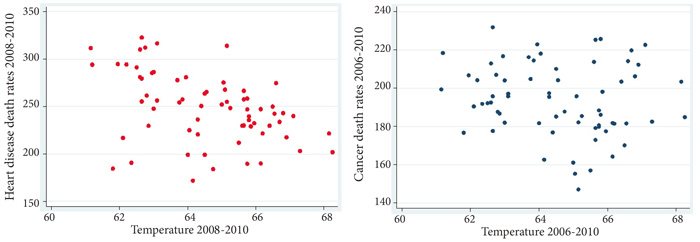| Follow @co2science |
Paper Reviewed
Hart, J. 2015. Association between air temperature and deaths due to cancer and heart disease in Alabama. Applied Scientific Reports 2: article 1, doi: 10.7243/2054-9903-2-1.
Citing the works of Longstreth (1991) and Zanobettia et al. (2012), Hart (2015) writes that "warm temperatures are thought to be associated with increased death rates." But rather than accepting this assumption at face value, the researcher from Greenville, South Carolina, USA set out to conduct a statistical analysis to prove it.
Using linear multiple regression analysis, Hart analyzed the relationship between daily mean air temperature and land elevation (both as predictor variables) and death rates from cancer and heart disease (the two response variables) over the period 2006-2010 and 2008-2010, respectively. In describing the outcome of his analysis, Hart reports there was no "statistically significant adverse health effects for either predictor with these response variables" (see figure below). However, as evident in the figure below, his analysis did reveal an inverse relationship between temperature and heart disease death rates, such that a one degree Fahrenheit rise in temperature would have the effect of reducing heart disease death rates by 12 persons per 100,000 over the temperature range analyzed in his study.
Such findings, in the words of the author, "contradict dire predictions of adverse health consequences as a result of global warming," yet are "consistent with a previous report that indicated a beneficial association between warmer temperatures and decreased mortality (Idso et al., 2014)."
And thus we find yet another example where a test of real-world data fail to match the doom and gloom prognostications of climate alarmists and their ever-failing models.

Figure 1. Scatter plots of heart disease death rates and mean temperature (left panel) and cancer death rates and mean temperature (right panel) for all 67 counties in Alabama. Source: Hart (2015).
References
Idso, C.D, Idso, S.B., Carter, R.M. and Singer, S.F. (Eds.) 2014. Climate Change Reconsidered II: Biological Impacts. Chicago, IL: The Heartland Institute.
Longstreth, J. 1991. Anticipated public health consequences of global climate change. Environmental Health Perspectives 96: 139-44.
Zanobettia, A., O'Neill, M.S., Gronlund, C.J. and Schwartz, J.D. 2012. Summer temperature variability and long-term survival among elderly people with chronic disease. Proceedings of the National Academy of Sciences 1097: 6608-6613.
Posted 20 December 2016



